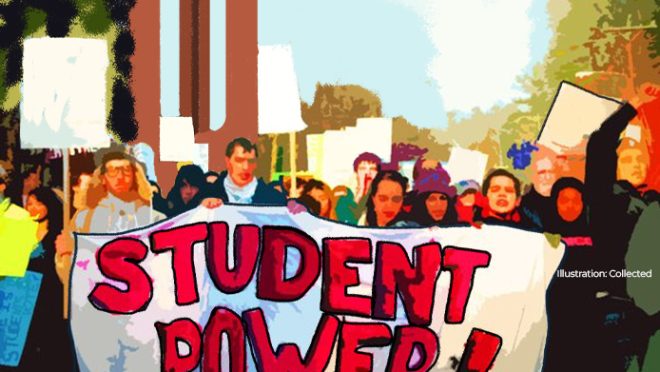Politics on campus: What do the students have to say
Politics on campus: What do the students have to say

5 August remains a bright example of how student-led movements have been defining the fate of Bangladesh. Started as a non-political movement led by the youths of the country it ultimately brought down the Awami League government which remained in power for 15 years.
Throughout history, student politics in Bangladesh has played a significant role in shaping the nation’s destiny, actively contributing to crucial moments of political and social change. That draws a big question, what might be the future scenario of student politics in universities? Let us hear what the students have to say.
The majority of the students, especially from public universities, emphasised that, after all the years of oppression, injustice, trauma, and terrorism caused by campus politics, people now want to do what they were destined to do at the campus.
“Universities are meant to produce knowledge and knowledgeable people, at its core, we want to stand by the core, as simple as that,” said Shadman Islam, a student from the Social Science Faculty of Dhaka University.
“The bludgeonings and menace have been enough, now we want to excel as a place made of future potentials not hooligans” said Mouri Halder, a BBA student from Rajshahi University.
“I want a university where halls, libraries, canteens, institutes,offices and other utilities will function like a top foreign university, paving the way for greater outcomes from the students ”, said Samin Yasar, a student at Bangladesh University of Textiles.
While most of the people want politics out of the premises, there are some opposing the idea. “We all know the history of campuses producing revolutionary leaders, statesmen who have changed the discourse of modern Bangladesh in so many ways. Why should the exercise stop?” said Koushik Khan, another student from the Social Science Faculty, DU.
Arian Faisal, a BA student fromat Jahangirnagar University said, “We believe universities are not just for education, it is more than that. They are meant to teach us about the country, people, governance, civic engagement, socio-politics, history, leadership etc. With the proper blending and learning of these, a true visionary can be created, who can contribute to the country by staying at the front. Politics is the gateway of staying at the front and serving at the root.”
Dibbyo Roy, a student from Chittagong University identified student politics as an extracurricular activity alongside education, which adds up to being a perfect patriot.
However, the opinion regarding campus politics is not as polarised as one might think. Some are still in the grey area stuck between contemplating the advantages and disadvantages of politics among students.
Some students suggested having a student cabinet instead of party-based politics.
“We seek cabinets that are mostly found in foreign countries which play an integral role in bridging the gap between students and university administration, ensuring that the student perspective is considered in policy decisions,” says Raihan Kazi, a student from Shahjalal University of Science and Technology (SUST).
“We have seen the era of DUCSU, RUCSU, CUCSU; some of the student councils in our universities. We suggest a modernised, student-friendly version of councils in our campuses, which will advocate for our voices, and ours only,” said Ashfaqul Islam, a student from DU.
However, there is a mirroring opinion to that where people did not vouch for the student council . “Student councils in Bangladesh are more or less representations of the student leaders of the ruling party, and their stakeholders. Thus, they focus only on their interests rather than what a student council should stand for, following the exact roadmap of party-led politics on campus,” said Sayem Rahman, a student of Bangladesh University of Engineering and Technology (BUET).
While talking to some students of different national universities, Muhammad Muin from Dhaka College, highlighted an important point regarding political influence among teachers and administration. “We are the worst sufferers of those practices on campus. Student politics turn vicious and power-centric in the shadows of those faculties and officers.”
Shormita Sharif, an undergraduate student from Titumir College, disclosed that the system is encompasses everyone starting from the student cadres, teachers to the bigger fishes, making a proper chain of command for carrying out power malpractices and suppression. She opined that politics should be banned in all levels comprising students, teachers and staff.
Interesting answers came from the students from private universities and military-run institutions.
“Politics is already banned here, however, the ragging culture in our premises resembles the dark reality of student politics in other universities, which we do not want to see in their campus anymore”, said Rajin Saleh, a BBA student from BUP.
“I root for student politics but outside the campus, not making the campus a machine for making political guinea pigs.” said Imam Hossain, an undergraduate student from BRAC University.
Most students from these universities wanted a peaceful, healthy, academic environment, in which an individual can bloom up to their best potential. People having separate viewpoints, having debates and reasonings and expressing them are the exact environment the masses have been looking for for years.
Some universities like KUET, DMC, BUTEX, Jatiya Kabi Kazi Nazrul Islam University have banned politics for students, teachers and staff and some are on the way.
It is still uncertain what will be the collective decision, however, it is sure that the youth has rejected the culture of opression in the name of student politics.


